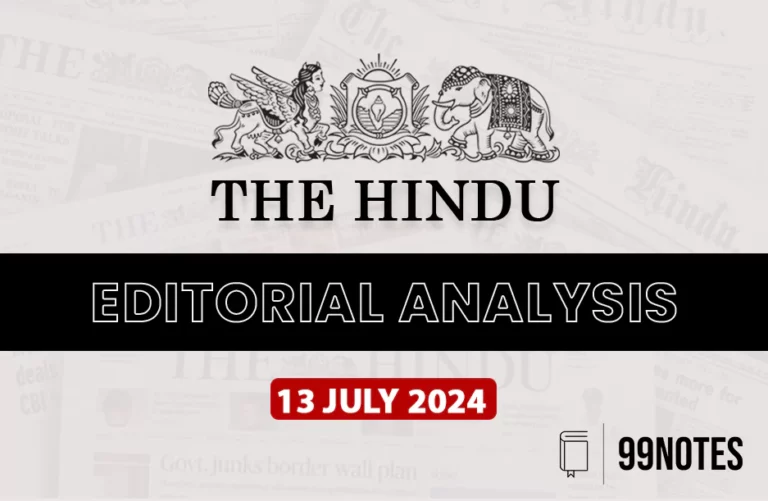7 February 2024 : The Hindu Editorial Notes PDF
The Hindu Editorial
7-February-2024
1. Union government’s reins on financial transfers to States.
| Topic: GS2 – Indian Polity – Constitutional Bodies GS2 – Functions & responsibilities of the Union & the States – Devolution of powers and finances Critical for UPSC as it addresses fiscal federalism challenges, centralization impact, and cooperative federalism principles in Indian governance and economics. |
| Context |
|
Reduction in Financial Transfers to States Since Fourteenth Finance Commission (2015-16):
- The Fourteenth Finance Commission recommended devolving 42% of Union tax revenues to States, a 10 percentage point increase from the 13th Finance Commission’s recommendation.
- However, the Union government has been reducing financial transfers to States since then, impacting the distribution of financial resources.
Basic Math on Tax Revenue:
- The gross tax revenue of the Union government more than doubled from ₹14.6 lakh crore in 2015-16 to ₹33.6 lakh crore in 2023-24.
- States’ share in Union tax revenue increased from ₹5.1 lakh crore to ₹10.2 lakh crore between these two years.
- Grants-in-aid to States declined from ₹1.95 lakh crore in 2015-16 to ₹1.65 lakh crore in 2023-24.
- The combined share of statutory financial transfers in the gross tax revenue declined from 48.2% to 35.32%.
Increase in Cess and Surcharges:
- Revenue collection through cess and surcharge increased from 5.9% (₹85,638 crore) in 2015-16 to 10.8% (₹3.63 lakh crore) in 2023-24.
- The Union government increases tax collection under cess and surcharge categories for its specific schemes, without sharing revenues with the States.
More Centralization of Public Expenditure:
- Decline in financial transfers to States results in larger discretionary funds for the Union government’s own expenditures.
- Centrally Sponsored Schemes (CSS) and Central Sector Schemes (CSec Schemes) are used for direct financial transfers to States.
- CSS allocation increased from ₹2.04 lakh crore to ₹4.76 lakh crore (2015-16 to 2023-24), influencing State priorities.
Inter-State Inequality in Public Finances:
- CSS shared schemes allow wealthy States to leverage Union finances, while less wealthy States must commit borrowed finances, increasing their liabilities.
- CSec Schemes, fully funded by the Union government, increased from ₹5.21 lakh crore to ₹14.68 lakh crore in 2023-24.
Scope for Anti-Federal Fiscal Policies:
- Financial transfers through CSS and CSec Schemes are non-statutory and not based on legal provisions or Finance Commission formulas.
- Non-statutory grants, forming 12.6% of gross tax revenue, restrict States’ freedom in public expenditure.
- Union government retains over 50% of gross tax revenue, incurring a fiscal deficit of 5.9% of GDP, giving it significant financial power with limited expenditure responsibilities.
Potential for Downward Revision in States’ Share:
- The Fifteenth Finance Commission noted the Union government’s argument for a downward revision of States’ share in Union tax revenue from 42% to 41%, citing higher expenditure commitments.
- The Union government may repeat this argument before the Sixteenth Finance Commission, raising concerns about cooperative federalism.
Conclusion:
- In conclusion, the Union government’s deviation from Finance Commission recommendations, coupled with increased cess and surcharge collections, raises concerns about the centralization of financial resources.
- This shift may exacerbate inter-state inequalities, limit states’ fiscal autonomy, and challenge the principles of cooperative federalism in India’s fiscal policies.
| Fiscal Federalism |
Introduction:
Key Features:
Challenges:
Reforms and Solutions:
Recent Developments:
Conclusion:
|
| PYQ: How have the recommendations of the 14th Finance Commission of India enabled the States to improve their fiscal position? (150 words/10m) (UPSC CSE (M) GS-2 2021) |
| Practice Question: Discuss the implications of the Union government’s deviation from Finance Commission recommendations on fiscal federalism and cooperative federalism in India. (150 words/10 m) |
2. Manipulation of Chandigarh mayor poll has grave implications for democracy
| Topic: GS2 – Indian Polity – Elections Critical understanding of electoral challenges ensures aspirants grasp the complexities of Indian democracy for comprehensive preparation of UPSC. |
| Context |
|
Additional information on this news:
- The Supreme Court of India criticized the election process of the Mayor of Chandigarh, suspecting manipulation in favor of BJP candidate Manoj Sonkar.
- Chief Justice expressed dismay over footage showing the presiding officer defacing ballots, calling it a “mockery of democracy.”
- The election, initially scheduled for January 18, was postponed to February 6, allegedly due to an ill BJP functionary, but later advanced to January 30 by court order.
| Issues with Electioneering in India |
Issues:
Implications:
Way Forward:
|
| PYQ: Discuss the role of the election Commission of India in the light of the Evolution of the Model Code of Conduct. (UPSC CSE (M) GS-2 2022) (150 words/10 m) |
| Practice Question: Critically examine the challenges in Indian electioneering. Analyze their implications for democracy and suggest concrete measures for a level playing field and ethical electoral practices. (250 words/15 m) |
For Enquiry

7 February 2024 : The Hindu Editorial Notes PDF

6 Feb 2024 : Daily Answer Writing

6 Feb 2024 : Daily Current Affairs

6 Feb 2024 : Daily Current Affairs Quiz

6 Feb 2024 : Indian Express Editorial Analysis

6 February 2024 : The Hindu Editorial Notes PDF

6 February 2024 : PIB Summary for UPSC

5 Feb 2024 : Daily Current Affairs Quiz

5 Feb 2024 : Daily Answer Writing

5 Feb 2024 : Indian Express Editorial Analysis
Feb 2024 The Hindu 7 February 2024 : The Hindu Editorial Notes PDF The Hindu Editorial
6-February-2024
1. A critical view of the ‘sanitation miracle’ in rural India.
Topic:…
mains answer writing 6 Feb 2024 : Daily Answer Writing Mains Answer Writing
6-February-2024
Q1) Heat waves are a silent natural disaster. Describe the criteria…
Daily Current Affairs 6 Feb 2024 : Daily Current Affairs Daily Current Affairs
6-February-2024- Top News of the Day
Stay updated with the Latest 6th February…
Daily Quiz 6 Feb 2024 : Daily Current Affairs Quiz 6 Feb 2024 : Daily Quiz…
Indian Express 6 Feb 2024 : Indian Express Editorial Analysis Indian Express Editorial Analysis
6-February-2023
1. Demography and destiny
Topic: GS1 – Society…
Feb 2024 The Hindu 6 February 2024 : The Hindu Editorial Notes PDF The Hindu Editorial
6-February-2024
1. A critical view of the ‘sanitation miracle’ in rural India.
Topic:…
feb 2024 PIB 6 February 2024 : PIB Summary for UPSC PIB Summary for UPSC
6-February -2024
1. Schemes for Restoration of Mangrove Forests
Topic: GS3…
Daily Quiz 5 Feb 2024 : Daily Current Affairs Quiz 5 Feb 2024 : Daily Quiz…
mains answer writing 5 Feb 2024 : Daily Answer Writing Mains Answer Writing
5-February-2024
Q1) The melting of the cryosphere due to climate change is a global…
Indian Express 5 Feb 2024 : Indian Express Editorial Analysis Indian Express Editorial Analysis
5-February-2023
1. Changing gears to grow
Topic: GS3 – Indian…




